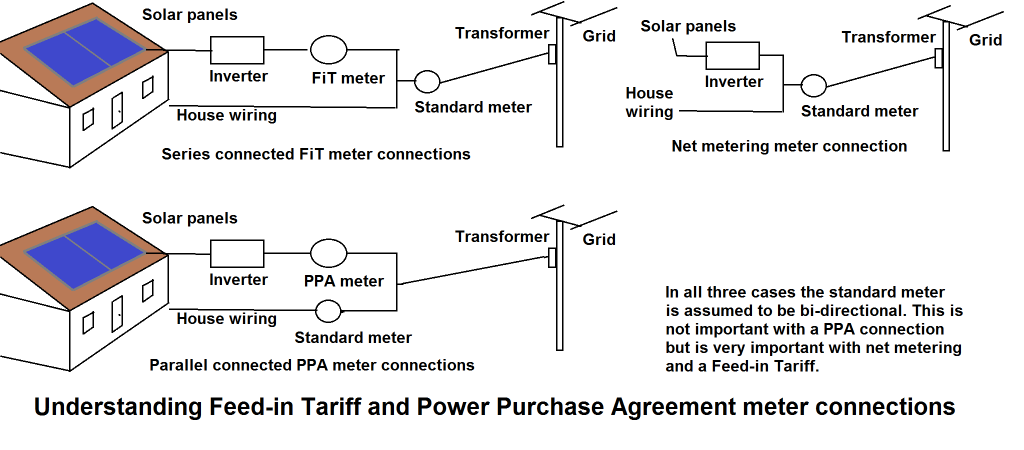Net metering is a concept that has been talked about extensively in the world of solar. But, what exactly does it mean for you and when will it come to India?
What is Net-Metering?
Net metering is basically you generating you own electricity and then feeding whatever you dont use into the existing grid. The policies in this differ a lot from region to region. There are two main benefits of net metering:
1. Feed Extra in to Grid: Whatever extra energy you produce, can be fed into the grid. This basically is significantly important because it allows you to bypass using battery bank to store energy that you dont consume for later. Batteries are expensive with high maintenance, net metering allows for a significant reduction in cost savings.
2. Switch to Grid when you use extra: Imagine that you have your own way of producing electricity; maybe a diesel genset or solar panels and one day you need extra electricity to power your new air-conditioner, but your generated electricity isnt enough. Net metering will allow you to take electricity that you are not able to cover from your system with grid electricity.
Ideally, net metering stands to benefit consumers substantially. Not only will you be able to save money by cutting the cost of batteries but you might also earn money by feeding extra electricity into grid.
How will you earn money? Most government policies give incentives for feeding electricity into the grid. So, lets say you have your own solar panels and you keep feeding energy into the grid, then you should actually get money for the amount of electricity you fed in.
What is Solar Net Metering?
Small scale or residential component of solar relies heavily on net metering. Net metering will reduce the cost of installing a solar system significantly because now you no longer need a battery bank. Also, net metering will allow you to earn money by feeding in the extra energy into the grid, this will bring the return on investment down significantly.

What’s going on with Solar Net Metering in India?
First its important to understand what going around the world. USA has successfully deployed net metering in most states, resulting in a substantial increase in solar acceptance. However, it is coming under fire for not charging its users for infrastructure and it’s maintenance. In India, no state has as of now rolled out net metering to a full extent.
1. Andhra Pradesh: NREDCAP/ APERC have policies to provide residential roof top net metering along with incentives. Govt. of AP also gives an additional subsidy on top of MNRE subsidy.
2. Gujrat: State Agency; GEDA is preparing to roll out net metering state wide in Gujrat.
3. Tamilnadu: TANGEDCO, has brought a commission for solar energy policy. However, net metering is yet to be adopted.
4. Other States: We will keep you updated on this page.
External Resources
- Andhra Pradesh Solar Net Metering Policy
- Gujrat Net Metering Policy
- Tamilnadu Solar Energy Policy
- Karnataka Energy Policy
Image source: Apteva
See Saurya Answers for more details: https://sauryaenertech.com/answer/question/solar-net-metering-india
Tags: solar net metering system india, solar net metering in india, what is net metering in solar energy, net meter grid connect solar systems, solar net metering ppt


yes, netmetering, and grid-tied systems have helped overcome the single most difficult aspect of solar energy implementation, namely, cost of batteries. The grid acts as an enormous battery, and is willing to pay you to boot for unused solar energy .
However grid-tying also poses a paradoxical situation.
If the grid fails, say during the day, the solar energy source fails too ! Just when it is actually needed ! Most Indian State Electricity Authorities appear averse to admit “grid-tied with battery back up” I wonder why.
A user then has no choice but have an inverter-battery combination connected to the load distribution panel. The charging voltage has to go through two conversions DC to AC and back again.
Is it possible to use the AC output of this inverter as reference voltage for the grid-inverter and keep it going ?
You dont need another separate inverter. Hybrid systems has both grid tie and back up battery. So you are disconnected from the grid as soon as grid goes off-line, and you are on your own with solar and battery, whichever is available at that time.
Net metering is benificial for individual as well as other consumers such as offices, educational institutions.using rooftop solar system.Because whatever extra energy is produced can be fed into the grid, this gives extra earning to consumer & also saving cost of the battery back up.further in case if solar generation is not sufficient to meet the consumer load during rainy days or in the night it can be met out from the grid supply through net metering system.Further in case grid failure is regular feature in particular area one can use battery back up.Further standard meter(Bi-directional meter), FiT Meter & PPA meter should be properly tested, calibrated & of Standard make as per Is-standard.
In net metering when the generation from the solar installation exceeds that of your consumption, the excess power will get exported back to the grid. However, your current (one-way) meter cannot sense the direction of the current, and even though you are not importing any power from the grid, the meter will still tick forward, thus adding more kWh (electricity units) to your bill rather than subtracting from it (which is what net-metering is supposed to do). This is a double blow because you are not only wasting the excess solar power generated and exporting it to the grid, you are being billed for those extra (exported) units from your utility company.
Nishi Jain
Urjaswa Solutions Pvt. Ltd
+91-731-3015888
http://www.urjawa.com
#Urjaswa